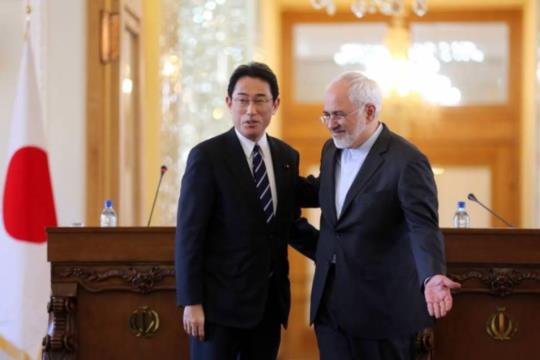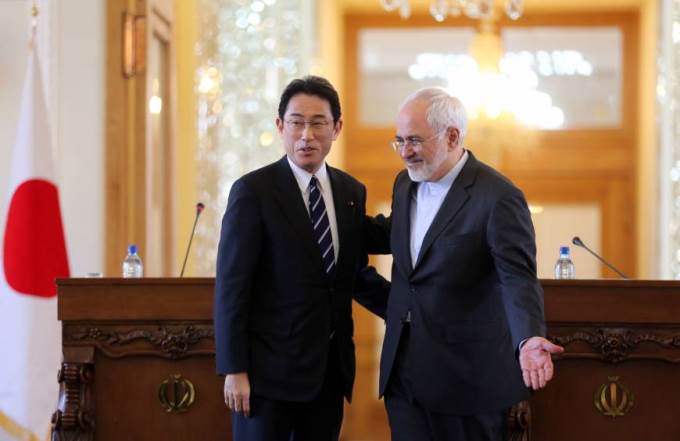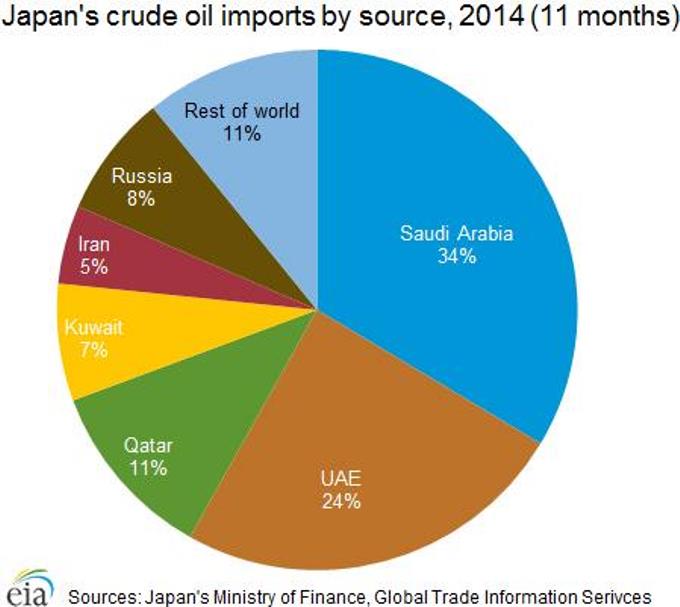
 |
| Iranian Foreign Minister Mohammad Javad Zarif and his Japanese counterpart, Fumio Kishida, are seen following their joint news conference in Tehran after agreeing on a bilateral investment pact. [AFP-JIJI] |
| Abstract Following last year’s landmark nuclear deal between Iran and the P5+1, Japan has looked to significantly bolster its relations with Iran and get ahead of international competitors, which similarly are looking to seize opportunities in Iran’s opening market. The recently concluded bilateral investment treaty is a good start and will allow Japanese companies to re-gain a foothold in the Iranian market. In addition to trade and investment, Tokyo and Tehran continue to be connected through trade in energy and also have developed strong people-people ties. While improving however, bilateral ties are tinged by Iran’s destabilizing behaviour in the Middle East – through the funding of Hezbollah and its activities in Syria and Yemen. |
Introduction
Japan and Iran have maintained historically strong ties over the years, underscored by strong links on energy, people-to-people ties and mutual investment opportunities. This relationship has been strained however over the past decade as questions loomed around Iran’s rapidly growing nuclear energy program and its potential desire to eventually develop an indigenous nuclear weapons program. For decades, Japan has been a strong voice in the international community against the proliferation of nuclear weapons and has maintained a stringent policy of its “Three Non-Nuclear Principles” of not possessing, producing or permitting the introduction of nuclear weapons. Additionally, Japan remains a key ally to the United States and has to manage a nuanced relationship with Iran in order to ensure that it mitigates any criticism from Washington. This balance between interests has been challenging for Japan-Iranian relations in recent years but there appears to a large opening now as a result of the nuclear deal.
Renewing Investment and Trade
On February 5, 2016, the Foreign Ministers of Japan and Iran signed a key bilateral investment treaty at a meeting in Tokyo. The signing of the treaty is a big step in Japan-Iran relations and follows through on commitments made during a meeting on the sidelines of the United Nations General Assembly last October by Japanese Prime Minister Shinzo Abe and Iranian President Hassan Rouhani which focused on economic ties. Abe and Rouhani agreed that Japan and Iran to work closely to facilitate Japanese companies investing in Iran. Abe held out investment as an inducement for Iran to comply with the agreement to limit Tehran’s nuclear program inked between Iran and the six world powers, known as the P5+1, earlier this summer. But Japan is also keen to resume the flow of energy imports from Iran, which were largely curbed as a result of the United Nations Security Council-mandated sanctions in place before the nuclear deal.
The new deal governs the life-cycle of the investment process from promotion of investments in both countries, and then extends to the admission and protection of investment projects. (1) In addition to winning a favoured hand on future investments, Japan also managed to protect its reputational interests through inserting a clause in the agreement which indicates that the agreement does not overlook the potential for other security problems:
“2. Nothing in this Agreement shall be construed to prevent a Contracting Party from adopting or enforcing measures:
a) which it considers necessary for the protection of its essential security interests:
I. taken in time of war, armed conflict, or other emergency in that Contracting Party or in international relations; or
II. relating to the implementation of national policies or international agreements respecting the non-proliferation of weapons; or
b) in pursuance of its obligations under the United Nations Charter for the maintenance” (2)
With the deal’s finalization, Tokyo is looking to kick-start relations with Tehran and revive previous efforts at investing in Iran’s energy sector. Japan isn’t alone, of course: Russia, China and several European countries have been stepping up their efforts to get an early foothold in the Iranian market as it opens back up to the world. Japan’s motivation to compete for a share of the investment opportunities in Iran is unambiguous. As Yoshihide Suga, Japan’s chief Cabinet secretary, recently explained about the bilateral investment treaty: “The aim of these negotiations is to protect the investment activities of Japanese companies. Japan will take the necessary steps and not be later than other nations.” (3)
 |
One of Japan’s key targets is Iran’s potentially lucrative Azadegan oil fields, near the border with Iraq. According to Iranian government estimates, the Azadegan fields could contain over 30 billion barrels of oil in reserve. Tokyo has been interested in working with Tehran to develop the oil fields for the past two decades and at one point, in 1996, had a nearly 75 percent stake in the southern Azadegan fields through Inpex, a Japanese oil company. That investment gradually dwindled over the years, but Japan still had a considerable 10 percent stake in Azadegan until 2010, when it was forced to pull out of Iran under pressure from the United States as sanctions were tightened.
Following Japan’s withdrawal, China moved in to seize the opportunity in Azadegan, adding intrigue and a new rival to Japan’s investment plans. The China National Petroleum Corporation (CNPC) acquired a stake in Azadegan’s development in 2010. Yet the deal was short-lived; frustrated by delays from CNPC, Tehran eventually dissolved the contract in April 2014. That has provided another chance for Japan to get back into Azadegan, as Iran is looking for investors with strong technical expertise.
With this new deal in place, it could be an opportune time for Japanese companies to seize market share in Iran. Indeed, on the Azadegan development – Iranian authorities have already been in discussion with Japanese companies such as Maurbeni and Inpex on future projects. The Japanese face stiff competition in the Azadegan as well. South Korean firm Hyundai and French firms Total, Vinci and Entrepose are also engaged in talks on getting a share in Azadegan projects.
As a complement to the pact, Tokyo also secured a pledge from Tehran of $10 billion – which, according to the Nikkei Asian Review, will be provided through Nippon Export and Investment Insurance and the Japan Bank for International Cooperation. Nikkei claims that these “funds will be guaranteed by the Iranian government, allowing the Japanese side to avoid losses.” (4)
Energy Relations
It should come as little surprise that better ties between Japan and Iran are framed predominantly around energy security issues. Japan, after all, remains highly dependent on foreign sources of energy, especially from the Middle East; last year, more the 80 percent of Japan’s crude oil imports came from the region. The largest suppliers are countries from the Gulf Cooperation Council (GCC), such as Saudi Arabia (34 percent), the United Arab Emirates (24 percent), Qatar (11 percent) and Kuwait (7 percent). Iran’s market share of oil exports to Japan has dropped precipitously over the past decade, from a peak of 16 percent of Japan’s total oil imports in 2003 to 5 percent last year.
Prior to the sanctions on Iran in 2006, Japan relied on Iran as one of its primary sources of foreign energy. Even during the sanctions period, Japan’s level of imports of Iranian oil remained significant—nearly 12 percent of total energy imports—until the Obama administration increased pressure on its allies for stronger compliance with the sanctions regime in 2012. That year, Tokyo was the fifth-largest importer of Iranian crude oil. But under the brunt of more stringent sanctions, Iranian oil exports to Japan dropped by more than 60 percent within a year. Tokyo’s energy needs have been magnified by the four-year self-imposed moratorium on nuclear reactors as a result of the 2011 nuclear crisis at Fukushima. Only recently have a few reactors went back online in the country. Japan previously relied on nuclear power generation for nearly a third of its domestic energy.
Security and Geopolitical Considerations
But it isn’t all about energy. Aside from the push to secure steady access to Middle Eastern oil, the Abe administration has been making a concerted effort over the past few years to strengthen Japan’s international role, working to dispel the notion of an isolated island. Amid this backdrop, Abe has made three trips to the Middle East since he was elected in December 2012. His extensive itineraries included visits to Turkey (twice), Egypt, Israel, Palestine, Jordan, Kuwait, the UAE, Oman, Qatar, Saudi Arabia and Bahrain. With the Iran deal and potentially improved ties between Tehran and the international community, it is possible that Abe may look to visit Iran in the coming years. At the very least, one can expect a higher exchange of senior diplomats and business people between the two countries. Just last month, Japan’s vice minister for economy, trade and industry visited Tehran, accompanied by several business officials in the oil and gas sector.
Yet despite these positive trends, Japan will likely take a cautious route in its reset with Iran, even if the mutual investment deal is reached and Japanese businesses return to Iran. Tokyo remains sensitive to the lingering problems in the relationship between its key ally, the U.S., and Iran, which are not limited to the nuclear issue. During a meeting between Foreign Ministers last year (5), Japan’s Foreign Minister Fumio Kishida expressed concern about Iran’s longstanding military cooperation with North Korea. Japan is also opposed to any destabilizing activities that Iran is undertaking in Yemen and Syria. And on the nuclear issue, Japan, as a strong opponent of nuclear proliferation, must continue to insist that Iran remain transparent and in compliance with the nuclear agreement. Investment might be a carrot for compliance, but it won’t overshadow deeper political sensitivities that will continue to keep Japan-Iran ties modest in the short term.
_________________________________________
Jonathan Berkshire Miller is founding director of the Council on International Policy and is a fellow on East Asia for the EastWest Institute. Miller is also a fellow on Japan for the Center for Strategic and International Studies Pacific Forum and chair’s the Forum’s Japan-Korea Working Group.
References
1 AGREEMENT BETWEEN JAPAN AND THE ISLAMIC REPUBLIC OF IRAN
ON RECIPROCAL PROMOTION AND PROTECTION OF INVESTMENT, Ministry of Foreign Affairs, Japan.
http://www.mofa.go.jp/files/000130577.pdf
2 Ibid.
3 http://www.channelnewsasia.com/news/world/japan-iran-to-start/2103932.html
4 “Investment pact clears way for Japanese businesses,” Nikkei Asian Review, February 6, 2016.
http://asia.nikkei.com/Japan-Update/Investment-pact-clears-way-for-Japanese-businesses
5 http://www.mofa.go.jp/me_a/me2/ir/page22e_000678.html